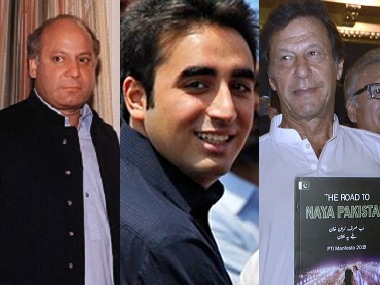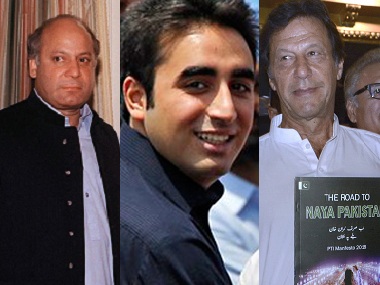The Pakistan Tehreek-e-Insaf (PTI) unveiled
its manifesto for the upcoming general elections on Monday with its chairperson Imran Khan saying his mission would be “to make Pakistan an Islamic welfare state”. He said he would transform the country “in line with the principles that made the foundation of Medina: Humanity and justice”. The PTI on Monday became the third and final party in the country to unveil its manifesto. The Pakistan Peoples Party (PPP) was the first one out of the blocks on 30 June and the Pakistan Muslim League-Nawaz (PML-N)
unveiled theirs on 6 July with the slogan ‘vote ko izzat do — khidmat ko vote do’ (Honour the vote — vote for performance). The Pakistani media devoted plenty of editorial space to the manifestos and analysed them in great detail. PML-N manifesto The Nation and Dawn found themselves on opposing sides of the PML-N manifesto. While The Nation wrote a glowing editorial praising the party for a “comprehensive” and “progressive” manifesto, Dawn called it an attempt to fight off the pall cast over the party by the recent court proceedings. [caption id=“attachment_4706051” align=“alignleft” width=“380”]
 File images of Nawaz Sharif Bilawal Bhutto and Imran Khan[/caption] Both newspapers highlighted the PML-N’s focus on the previous five years it spent in power, but in contrasting ways.
The Nation compared the manifesto to an audit report and said it was the only party which gave considerable space to the achievements of the last five years in provinced they ruled. “Credit goes to the party for being brave enough to talk about its performance in its last tenure,” it wrote. On the other hand,
Dawn said much of what was promised remains undelivered. “Development has been patchy, with the smaller provinces accusing the federal government of favouritism. True, militancy has been controlled, but this is in spite of the PML-N rulers’ inaction. The manifesto ignores these sore points and claims that the party has built a sufficient base for it to carry on,” it wrote. The News International also looked at the party’s 2013 manifesto and analysed it point by point. From bringing down electricity costs to reducing political interference in State-owned enterprises and depoliticising the police, the newspaper looked at 20 pledges made by the PML-N and labelled most of them “nothing done”. PPP manifesto The News International had
glowing things to say about the PPP manifesto. Akram Shaheedi wrote in an editorial that the manifesto is “heavily tilted in favor of the ‘voiceless, shirtless and shoeless class of society’ that had been subjected to want and deprivation due to the wrong policies of the PML-(N) government widening the gap between the haves and have-nots”. “The PPP stands committed to improve the lot of this section of the society… Pakistan has an agriculture economy, and it is flagged as the very important segment of the PPP manifesto…. This time if the PPP is voted to power, plans to introduce Kissan Card that will entitle the farmers availability of subsidy on fertiliser without the bureaucratic hassle of any type,” it wrote. Dawn, on the other hand, asked
if PPP’s manifesto would be enough to return the party to power, and compared the situation to 2013 when the party made almost identical promises only to have the electorate disagree and plummet its vote share to half. The editorial also looked at the manner in which the party failed to live up to its promises of 100,000 homes for the poor in 2008 and the short shrift given to issues such as press freedom and civil services reform.
The Express Tribune also slammed the party in an editorial titled All talk, little action: PPP reiterates pledges to protect minorities. “As the elections draw closer, the PPP has once again made promises in its manifesto to prevent forced conversions, but the party’s leaders failed to justify why they relented to the extremist elements and did not pass the law to protect minorities,” it said.
The Pakistani media covered the issue of parties releasing their manifestos in great detail, with a lot of editorial space being devoted to analysing the three editorials
Advertisement
End of Article


)

)
)
)
)
)
)
)
)



